Summer Programs Bring New and Future Students to Campus
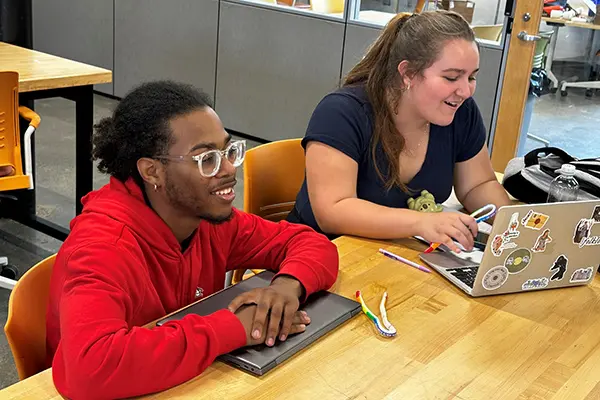 Image by K. Webster
Image by K. Webster
08/09/2024
By Katharine Webster
Incoming mechanical engineering major Sneyker Medrano has already taken two free classes at UMass Lowell: one in summer 2023 when he was a pre-engineering student at Greater Lowell Technical High School, and one this summer for incoming first-year engineering majors and high school students.
Both Understanding Power, Resisting Injustice, Summer Experience (UPRISE), which brings students from partner high schools to live on campus for two weeks while taking the sociology class Social Problems, and Research Academics & Mentoring Pathways (RAMP), a six-week, in-person engineering program that includes a free math class, have better prepared him for full-time college this fall, Medrano says.
“What I liked about UPRISE was that for the first time, I got to work on a (social justice) project in such a professional way,” says Medrano, a Lowell resident whose family immigrated from the Dominican Republic when he was 7 and who wrote his final research paper on the difficulties immigrants face in transferring their professional credentials to the U.S.
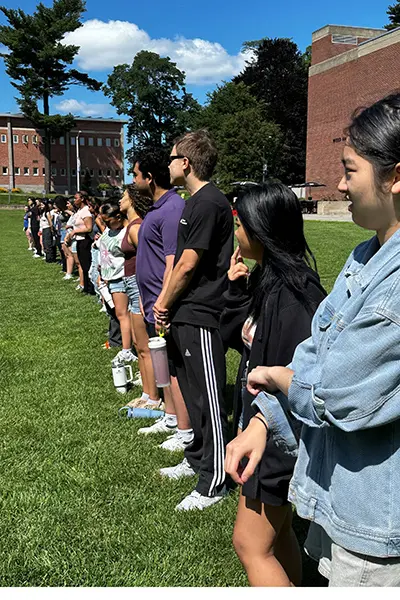 Image by K. Webster
Image by K. Webster
Medrano applied to and was accepted at UMass Lowell. He learned about RAMP while attending Welcome Day and decided to sign up.
“I got a leg up in getting ready for how the year’s going to be, so I feel like it was a great decision,” he says. “I’ve met students who are going to be first-years with me, met some of the faculty, and I’ve gotten to meet people from industry – and it seems like they (industry people) are interested in us even before we’ve started college.”
A range of UML summer programs offers a head start on college to incoming first-year students, transfer students and high school students, as well as a chance to make friends, says Justin Gerstenfield, director of advising operations, technology and events.
And many are free, including First to Launch, for incoming first-generation college students; RAMP; and two other programs focused on bringing more diversity to the STEM fields.
All the programs offer a personalized experience and training in skills and resources that will set students up for college success, Gerstenfield says.
“Our faculty and staff create really tailored experiences for these students, letting them know they’re in the right program at the right school and helping them make those faculty connections,” he says.
Here’s a look at some of them.
First to Launch!
First to Launch is a six-week summer program for new, first-year UML students who have joined the River Hawk Scholars Academy (RHSA), the university’s nationally recognized support program for first-generation college students.
Students can take one summer class on campus for free or receive a $350 credit toward their fall tuition or the campus bookstore. They all come to the RHSA space in O’Leary Library each Friday to meet each other and learn about everything from advising and tutoring to campus wellness resources, says Esmeralda Levesque, RHSA program coordinator.
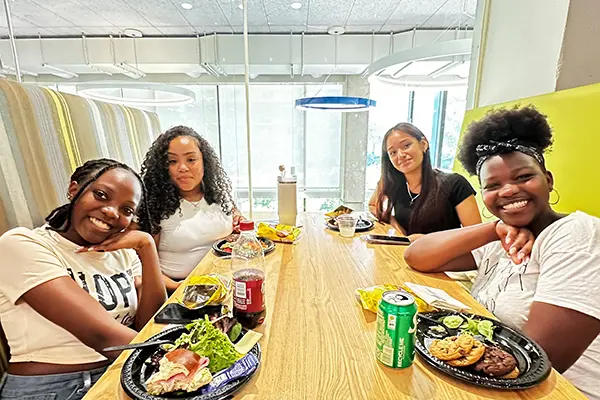 Image by K. Webster
Image by K. Webster
Mariana Taveras, an incoming nursing major from Providence, Rhode Island, signed up to meet other first-generation college students and take a medical terminology class.
“I also wanted to meet other people from my major, because nursing is a very hard major and I feel like I need to make those connections to get through – and to feel less alone,” she says.
And she did. On a recent Friday, Taveras laughed over lunch with fellow nursing major Marina Artiga, of Chelsea, Massachusetts, and two other new friends. Taveras and Artiga will both move into the River Hawk Scholars Academy’s living-learning community this fall.
UML Liftoff
UML Liftoff is open to any college-bound student, including incoming first-year UMass Lowell students in any college or major, and rising high school juniors and seniors.
Students in Liftoff take one or two summer classes either online or on campus – incoming UML students get a discount on the first class – and get tutoring and regular check-ins with first-year advisors.
While fewer students participate than in the more specialized programs, the course selection is wider, Gerstenfield says, and the Honors College version includes the popular Designing Your Life experience, which helps students come up with a detailed plan for achieving their college and life goals.
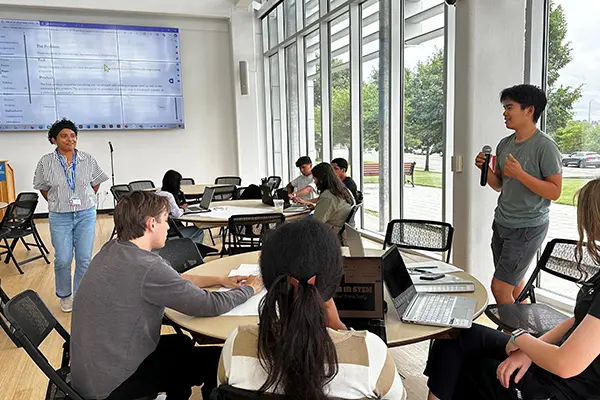 Image by K. Webster
Image by K. Webster
RAMP – Research, Academics and Mentoring Pathways
RAMP, the six-week program offered by the Francis College of Engineering, introduces incoming first-year UML students and high school juniors and seniors to engineering teamwork, research opportunities with faculty and potential career paths.
The program, free to the students thanks to industry grants and scholarships, includes a four-credit math class (Precalculus II or Calculus I); field trips to companies; talks with faculty, alumni and industry professionals; and a product design project that also strengthens students’ computer skills.
“I’m surprised how much I’m enjoying the coding,” says Abbey Nass, an incoming chemical engineering major from Princeton, Massachusetts. “I’m really liking all the teamwork; everyone is from so many different places and backgrounds.”
Nathan Nguyen, a rising senior at Chelmsford High School, especially enjoyed visiting the Lowell Center for Space Science and Technology and learning about computer architecture from Asst. Prof. Orlando Arias.
“My favorite thing is just being able to go around campus and see different departments, what they do, and meet individual professors and hear about their experiences,” he says.
RAMP aims to boost the skills of students from groups that are underrepresented in engineering, including women, first-generation college students and students of color, says Assoc. Dean Kavitha Chandra, who started RAMP in summer 2018.
From 2018 to 2023, 110 students took part, including 83 women, say Chandra and Paulette Brooks, manager of undergraduate programs and outreach. And of the 19 high school students who have joined RAMP over the past two summers, seven have matriculated at UMass Lowell.
Nguyen may join that group; he says he plans to apply to UML.
This year, for the first time, RAMP also includes training in leadership skills so that students in the new RAMP Club can continue the mission of promoting diversity in engineering, both on campus and at outreach events, Chandra says.
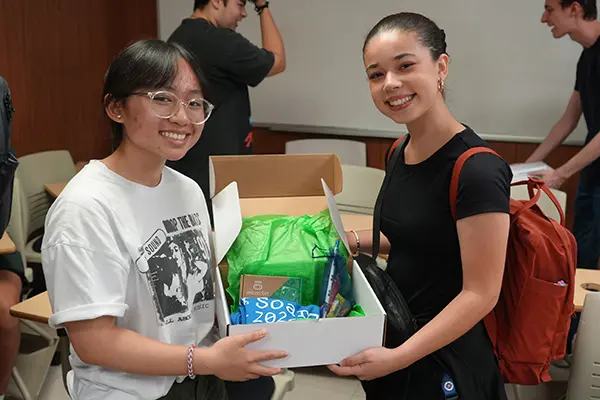 Image by Brooke Coupal
Image by Brooke Coupal
SoarCS
SoarCS is a free, four-week program for incoming first-year students majoring in computer science. As with RAMP, students from diverse backgrounds are encouraged to attend.
Conducted partly online and partly on campus, SoarCS introduces students to three programming environments: MYR, a web-based platform that allows students to create virtual reality scenes; micro:bit, a pocket-sized computer that can be programmed; and Python, a programming language widely used for building web pages and data mining.
“I’ve never used a 3D program before where you have to write the code, so learning about MYR was really cool,” says Olivia Porto, of Pelham, New Hampshire, one of 50 students taking part this summer. “I’m getting more familiar with campus and where my classes are, and I’m meeting a lot of new people and professors, who are all super-friendly.”
SoarCS is sponsored by Red Hat and Teradyne.
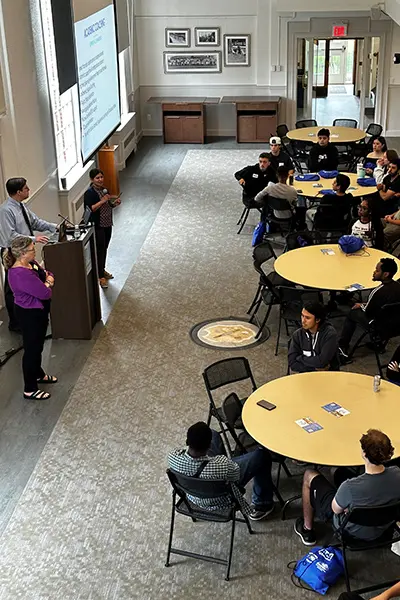 Image by K. Webster
Image by K. Webster
STEM Starter Academy
STEM Starter Academy is a bridge program for any Massachusetts community college student interested in transferring to UMass Lowell or another four-year school to complete a bachelor’s degree in engineering, science, math, technology, quantitative economics or certain majors within health sciences.
While the structure is similar to First to Launch, students may choose any summer class that counts toward their major or the core curriculum requirements, whether the course is in person or online. Tuition is free.
Students who do plan to transfer to UMass Lowell are encouraged to join TAP, the Transfer Alliance Program, which provides support, resources and peer mentoring throughout their first semester.
CatalyzeUML
Incoming first-year chemistry majors can take advantage of CatalyzeUML, a free three-day program that brings students to live on campus, eat in Fox Dining Commons and go on a North Campus scavenger hunt.
This year, 12 students are getting lab experience in forensics and nanoscience, doing team-building exercises and hearing from past students and faculty about research, internship and co-op opportunities, says Chemistry Asst. Prof. Michael Ross.
“It’s designed to give them a good community as they enter the year, build excitement and motivation to pursue chemistry and give them the skills needed for success in our major."


